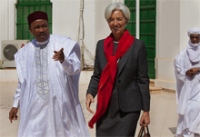
IMF Managing Director Christine Lagarde in Niamey, Niger, with President Mahamadou Issoufou during her two-day visit to the country (Stephen Jaffe/IMF)
The IMF and Civil Society
IMF Chief Visits Africa
January 10, 2012
Problems in the advanced economies might seem a world away from Africa, but in today’s interconnected global economy, no country and no region is immune to risks, IMF chief Christine Lagarde said.
Speaking during her first trip to Africa as head of the IMF, Lagarde cautioned that without action to implement a solution, especially in the euro area, the world economy could be swept into a downward spiral of collapsing confidence, weaker growth, and fewer jobs.
Good economic policies in sub-Saharan Africa had provided a platform for progress in the region toward higher growth, more investment, and less poverty, Lagarde told a December 20 meeting in Lagos, Nigeria. But now spillovers from the advanced economies threatened the region, she stated.
Lagarde visited Nigeria and Niger December 18-22 during the first leg of her African tour, and and traveled to South Africa January 5–7, 2012, to complete her African trip.
Testing Africa’s resilience
After an effective African response to the food and fuel crisis of 2008 and the global financial crisis that followed, the latest fallout from the advanced economies is testing Africa’s resilience again, Lagarde said in Niamey, Niger.
“The trade and financial ties, so critical to driving our economies forward in good times, have—ironically—become the linkages that can spread today’s escalating economic risks,” she said during a December 21 address to Niger’s National Assembly.
“A sustained growth slowdown in advanced countries, together with continued financial market instability, will dampen demand for Africa’s exports. It may also inhibit private financing flows, remittances, and possibly aid,” Lagarde told Niger’s legislators.
In a statement at the end of her visit to Niger, Lagarde noted pressures on the country from the impact of the crisis in neighboring Libya, and a decline in agricultural production and rising food shortages in parts of Niger. She said the authorities and an IMF team had reached agreement on an economic program for 2012–14 that could be supported with about $123 million under the IMF’s Extended Credit Facility, subject to approval by the IMF’s management and Executive Board.
Oil Revenues
Lagarde’s speech in Niger revisited natural resources themes that she also mentioned in Nigeria, Africa’s largest oil producer. Lagarde told the Lagos meeting that Nigeria’s establishment of a sovereign wealth fund and its emphasis on using oil revenues for stabilization and investment were important advances.
In a statement at the end of her visit to Nigeria following discussions with President Goodluck Jonathan, Finance Minister Ngozi Okonjo-Iweala, and Central Bank of Nigeria Governor Sanusi Lamido Sanusi, Lagarde said the prime objective of her trip was to listen to the IMF’s African members. Her itinerary also included meetings with representatives of civil society and the private sector.
Deeper partnership
Lagarde stressed during her African trip that the IMF was ready to support its sub-Saharan African members, and to “be a better partner.
“I am committed to a deeper, more fruitful dialogue, with the IMF listening even more carefully to your needs. This will help us serve you even more effectively,” she told the Lagos meeting.








